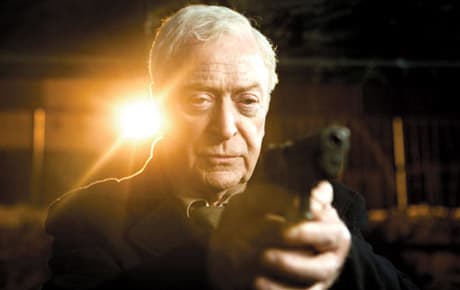Looks like Daniel Barber didn't get the memo regarding the death of the Western. Though everyone from Sam Peckinpah (with The Wild Bunch), John Hillcoat (with The Proposition) and Clint Eastwood (with Unforgiven) have hammered nails into the genre's coffin and its recurring theme of regeneration through violence, Barber seems determined to revitalize the Western, trading dusty saloons for rundown British pubs and "savage" aboriginals for callous, dope-slinging teenagers.
Michael Caine plays Harry Brown, an ex-marine and widower who plans to fight fire with fire when his only friend (Liam Cunningham) is brutally beaten by a group of housing project punks. Armed to the teeth with automatic pistols, a standard issue bayonet and an old school thirst for street justice, Brown sets about coldly killing the pubescent heroin pushers responsible for his friend's death.
Like Eastwood in last year's laughable Gran Torino, Caine essentially plays a version of himself, distilling his heyday heroics in films like The Italian Job and Get Carter through the lens of No Country For Old Men-styled nihilism. But unlike other films that use the excesses of screen violence as a means of questioning the ethics of violence, both on and off screen, Barber seems to be taking his cues not so much from Cormac McCarthy as from the Death Wish films. Like Bronson with a pension, Caine shuffles through the nightmarish urban cityscape of Harry Brown, his quest for revenge beset by incompetent police officers, one-dimensional child villains and uninspired plot twists.
While Caine is compelling as ever as the aging protagonist seeking meaning, or at the very least, some rigid notion of justice, in a world gone mad with senseless violence — an opening scene sees gang members gunning down a single mother, just for kicks — Harry Brown foregoes integrity in favour of vigilantism and conservative hysteria.
And worse, unlike the reactionary rape/revenge crime dramas of the '70s and '80s whose legacy it dubiously inherits, Harry Brown is far too sombre and mean-spirited to be any fun.
(E1)Michael Caine plays Harry Brown, an ex-marine and widower who plans to fight fire with fire when his only friend (Liam Cunningham) is brutally beaten by a group of housing project punks. Armed to the teeth with automatic pistols, a standard issue bayonet and an old school thirst for street justice, Brown sets about coldly killing the pubescent heroin pushers responsible for his friend's death.
Like Eastwood in last year's laughable Gran Torino, Caine essentially plays a version of himself, distilling his heyday heroics in films like The Italian Job and Get Carter through the lens of No Country For Old Men-styled nihilism. But unlike other films that use the excesses of screen violence as a means of questioning the ethics of violence, both on and off screen, Barber seems to be taking his cues not so much from Cormac McCarthy as from the Death Wish films. Like Bronson with a pension, Caine shuffles through the nightmarish urban cityscape of Harry Brown, his quest for revenge beset by incompetent police officers, one-dimensional child villains and uninspired plot twists.
While Caine is compelling as ever as the aging protagonist seeking meaning, or at the very least, some rigid notion of justice, in a world gone mad with senseless violence — an opening scene sees gang members gunning down a single mother, just for kicks — Harry Brown foregoes integrity in favour of vigilantism and conservative hysteria.
And worse, unlike the reactionary rape/revenge crime dramas of the '70s and '80s whose legacy it dubiously inherits, Harry Brown is far too sombre and mean-spirited to be any fun.
